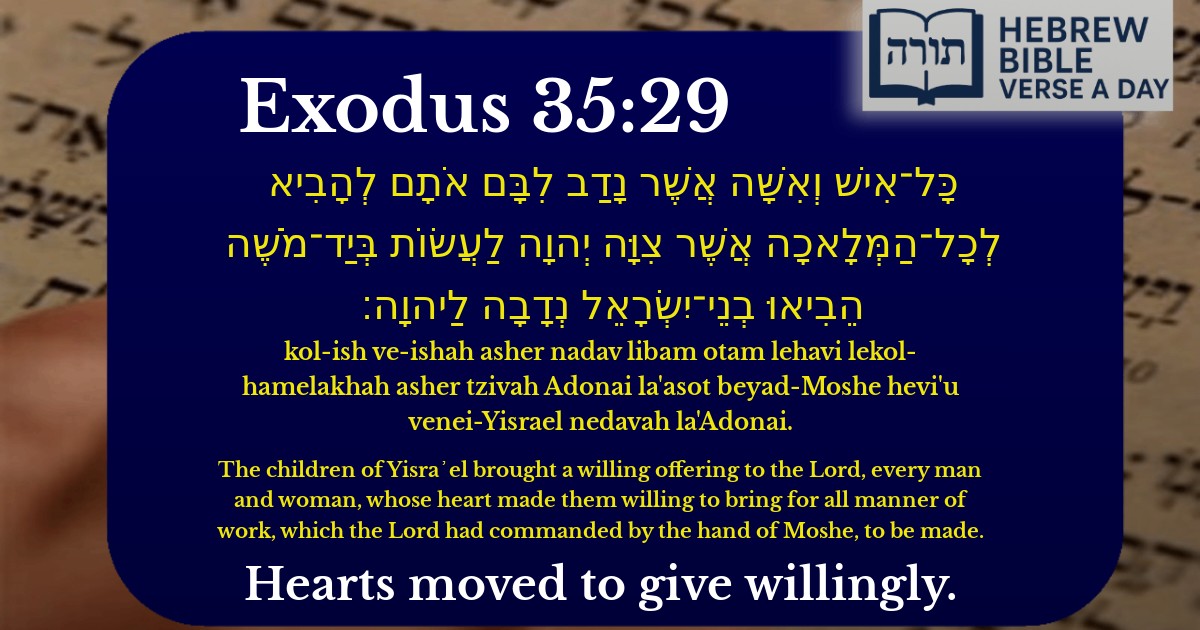Join Our Newsletter To Be Informed When New Videos Are Posted
Join the thousands of fellow Studends who rely on our videos to learn how to read the bible in Hebrew for free!
Hebrew Text
כָּל־אִישׁ וְאִשָּׁה אֲשֶׁר נָדַב לִבָּם אֹתָם לְהָבִיא לְכָל־הַמְּלָאכָה אֲשֶׁר צִוָּה יְהוָה לַעֲשׂוֹת בְּיַד־מֹשֶׁה הֵבִיאוּ בְנֵי־יִשְׂרָאֵל נְדָבָה לַיהוָה׃
English Translation
The children of Yisra᾽el brought a willing offering to the Lord, every man and woman, whose heart made them willing to bring for all manner of work, which the Lord had commanded by the hand of Moshe, to be made.
Transliteration
Kol-ish ve-ishah asher nadav libam otam lehavi lekol-hamelakhah asher tzivah Adonai la'asot beyad-Moshe hevi'u venei-Yisrael nedavah la'Adonai.
Hebrew Leining Text
כׇּל־אִ֣ישׁ וְאִשָּׁ֗ה אֲשֶׁ֨ר נָדַ֣ב לִבָּם֮ אֹתָם֒ לְהָבִיא֙ לְכׇל־הַמְּלָאכָ֔ה אֲשֶׁ֨ר צִוָּ֧ה יְהֹוָ֛ה לַעֲשׂ֖וֹת בְּיַד־מֹשֶׁ֑ה הֵבִ֧יאוּ בְנֵי־יִשְׂרָאֵ֛ל נְדָבָ֖ה לַיהֹוָֽה׃ {פ}


The Nature of the Willing Offering (Nedavah)
The verse describes the voluntary contributions of the Israelites for the construction of the Mishkan (Tabernacle). Rashi (Exodus 35:21) emphasizes that the phrase "כָּל־אִישׁ וְאִשָּׁה אֲשֶׁר נָדַב לִבָּם" ("every man and woman whose heart made them willing") highlights the sincerity and enthusiasm of the donors. Unlike obligatory gifts, this was a free-will offering, demonstrating their love for Hashem and commitment to the Mishkan.
The Role of Men and Women in the Contribution
The inclusion of both men and women in this verse is significant. The Midrash Tanchuma (Pekudei 9) notes that women were particularly eager to contribute, often giving more generously than the men. Their involvement underscores the equal spiritual role of both genders in supporting the Mishkan, which served as the dwelling place of the Divine Presence.
The Commandment Through Moshe
The phrase "אֲשֶׁר צִוָּה יְהוָה לַעֲשׂוֹת בְּיַד־מֹשֶׁה" ("which the Lord had commanded by the hand of Moshe") teaches that the people's generosity was directed by divine instruction. Rambam (Hilchos Beis HaBechirah 1:12) explains that voluntary offerings for sacred purposes must align with the guidelines given by Moshe, ensuring that the contributions were used appropriately for the Mishkan's construction.
The Unity of Bnei Yisrael
The collective phrase "הֵבִיאוּ בְנֵי־יִשְׂרָאֵל נְדָבָה לַיהוָה" ("the children of Yisrael brought a willing offering to the Lord") reflects the unity of the nation in this sacred endeavor. The Talmud (Yoma 75a) compares this moment to the giving of the Torah at Har Sinai, where Klal Yisrael acted as "one person with one heart." Here, too, their shared generosity symbolized their collective devotion.
Lessons in Generosity (Nedivus Lev)